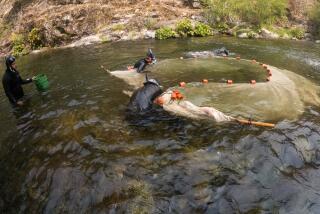Editorial: Collapse of deal to remove Klamath dams is a bad omen for water progress
The Klamath River winds from southern Oregon through the Cascades and into some of California’s most rugged country. For much of its journey to the Pacific it runs wild, but four hydro-electric dams on its upper reaches block the migration of salmon and in many years provide too little water, and at the wrong temperature, for spawning. A set of hard-fought agreements brokered in 2009 among farmers, power producers, indigenous tribes, environmentalists, federal agencies and others to divvy up Klamath water and remove the dams promised healthier salmon runs and a better livelihood to people who depend on the fish. But Congress doomed the accords by failing to sign on before adjourning this month.
It is a shame that the spirit of compromise that brought together so many interests that were so long at odds was scuttled by the exasperating no-deal congressional culture.
Water from some Klamath tributaries is diverted for irrigation projects farther south. Otherwise, though, the river is only tangentially related to the tangle of projects and accords that supply water to agriculture and urban areas in most of California, so the agreements held little in the way of direct benefit for water users in the rest of the state.
As a model for those who fight over water from California’s larger basins, though, the agreements were supremely important. Each interest in the Klamath went years holding out for scorched-earth victory but ultimately compromised and won something for their mutual benefit, including restoration of the largest and most important river between the Columbia and San Francisco Bay. If those parties could collaborate on a plan to restore the upper Klamath, surely the interests that have fought for decades over the Sacramento-San Joaquin River Delta and the water that flows through it could also come to terms.
So Congress’ failure to act on the Klamath agreements is likewise a supreme disappointment. Key portions are due to expire Jan. 1, and now the parties are internally torn. Should they try to salvage the deal by recommitting to the same accords they reached nearly seven years ago and keep lobbying Congress to accept them? Or should they each return to their corners and fight to extract better terms from one another?
Removing dams was bad politics for the many congressional Republicans who are considering funding more dams across California — despite numbers that show relatively small yields of water at very high costs. It is a shame that the spirit of compromise that brought together so many interests that were so long at odds was scuttled by the exasperating no-deal congressional culture. And it’s a bad omen at the start of a new year filled with challenges for water adversaries who will have to step up, not scale back, their engagement if they expect to see any progress.
Follow the Opinion section on Twitter @latimesopinion and Facebook
More to Read
A cure for the common opinion
Get thought-provoking perspectives with our weekly newsletter.
You may occasionally receive promotional content from the Los Angeles Times.










